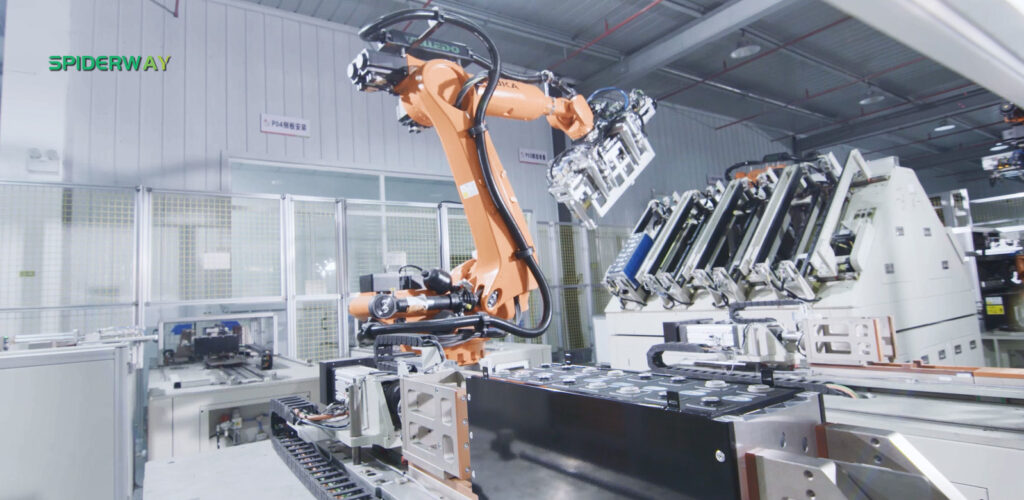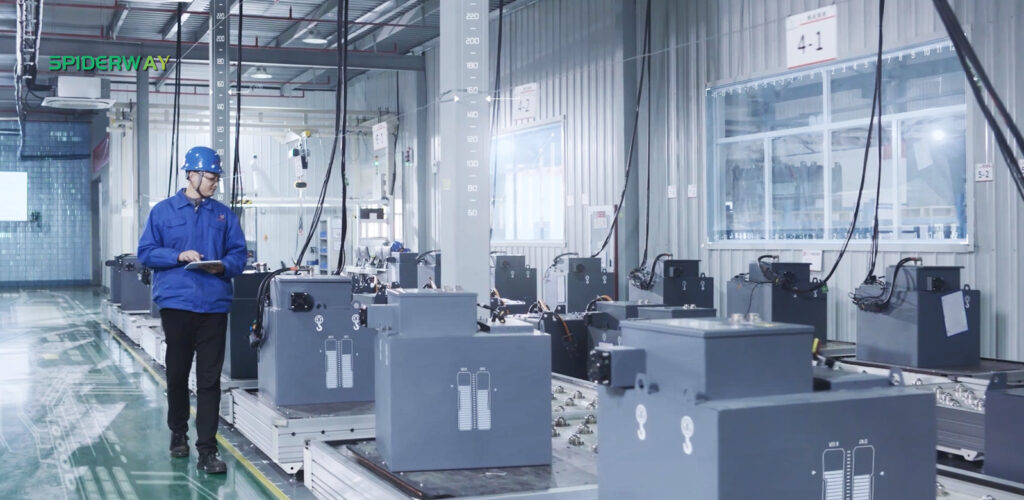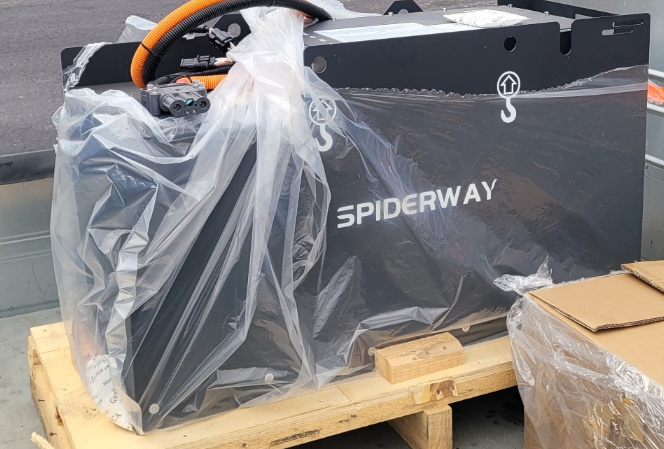
The industrial sector is evolving at an accelerated pace, driven by technological advancements in battery technologies, particularly within the realm of lithium-ion batteries. As we approach 2025, the demand for high-performance, cost-efficient, and sustainable energy storage solutions has never been greater. Lithium iron phosphate (LFP) batteries, known for their high efficiency, safety, and environmental advantages, are poised to play a central role in powering industrial vehicles, from electric forklifts to autonomous delivery robots. This article delves into the key trends and innovations in industrial lithium battery technologies, examining what the future holds, while also highlighting Spiderway's cutting-edge LFP industrial vehicle batteries.
The Evolution of Industrial Lithium Batteries
Over the past decade, lithium-ion batteries have become the gold standard for various industrial applications due to their superior energy density, long cycle life, and fast charging capabilities. As industries move towards electrification, particularly in material handling and logistics, the demand for high-performance batteries has surged. This trend is expected to intensify by 2025, driven by increasing environmental concerns, regulatory pressures, and the ongoing push for sustainability.




In particular, lithium iron phosphate (LFP) batteries have gained considerable traction in the industrial sector. Their inherent safety, cost-effectiveness, and long life cycle make them an ideal choice for powering electric forklifts, automated guided vehicles (AGVs), and other heavy-duty industrial vehicles. As the technology progresses, the adoption of LFP batteries in industrial applications is set to expand, offering greater efficiency and scalability for diverse operational needs.
Key Developments in Lithium Battery Technology by 2025
Looking ahead to 2025, several technological advancements are expected to reshape the industrial lithium battery landscape. Here are some of the most notable developments:
- Improved Energy Density: As battery manufacturers refine their chemistry, lithium batteries are becoming more energy-dense. This allows for longer operational hours without the need for frequent recharges, which is particularly crucial for industrial vehicles that require extended use in demanding environments.
- Faster Charging Times: Time is money, especially in industrial settings. In 2025, expect to see charging times for industrial lithium batteries reduced significantly. This development will allow for quicker turnarounds in warehouse operations, leading to enhanced productivity.
- Better Thermal Management: One of the challenges with lithium-ion batteries is their heat management. By 2025, thermal management systems are expected to be more advanced, preventing overheating and ensuring safer operations in industrial environments.
- Longer Battery Lifespan: With continuous improvements in battery chemistry and design, we can expect industrial lithium batteries to last even longer. This extends the total cost of ownership for industrial vehicles and reduces the frequency of battery replacements.
- Sustainability Enhancements: The need for sustainable practices is driving the demand for eco-friendly battery solutions. By 2025, manufacturers will introduce more sustainable and recyclable battery components, aligning with global efforts to reduce waste and carbon footprints.
Impact on Industrial Vehicles
Lithium-ion batteries, particularly LFP variants, will continue to make waves in industrial vehicle applications. Here’s how they are expected to revolutionize the sector:
- Electric Forklifts: LFP batteries are well-suited for powering electric forklifts, offering a longer lifespan and better thermal stability compared to traditional lead-acid batteries. They are also lighter, which translates into greater lifting capacity and efficiency.
- Automated Guided Vehicles (AGVs): The use of lithium batteries in AGVs is growing rapidly due to their ability to support long cycles without compromising on performance. By 2025, LFP batteries are expected to power a significant portion of the AGV fleet, facilitating smoother and more reliable automation processes in warehouses and factories.
- Material Handling Equipment: Other material handling equipment, such as pallet jacks and reach trucks, are increasingly being electrified, driven by the benefits of lithium-ion power. The reduced weight and higher efficiency of LFP batteries allow these vehicles to run longer, thereby increasing the overall throughput of warehouses and distribution centers.
- Mining and Construction Vehicles: In harsh industrial environments like mining and construction, the demand for rugged, reliable, and energy-efficient power solutions is high. LFP batteries’ durability and resilience make them an attractive choice for powering electric mining trucks and other heavy-duty vehicles.
Spiderway LFP Industrial Vehicle Lithium Batteries
As industries worldwide continue to embrace lithium battery technologies, Spiderway has emerged as a leading provider of LFP batteries specifically designed for industrial vehicle applications. With a commitment to innovation and excellence, Spiderway’s LFP batteries offer unparalleled advantages for businesses looking to optimize their operations.
Key Features of Spiderway’s LFP Batteries:
- Long Life Cycle: Spiderway’s LFP batteries are engineered for a long life span, providing up to 2,000 charging cycles, ensuring less downtime and lower maintenance costs for industrial vehicles.
- Safety and Stability: With a stable and safe chemical composition, Spiderway’s LFP batteries are designed to prevent thermal runaway, reducing the risks associated with overheating or fire, which is especially crucial in industrial environments.
- High Energy Density: These batteries offer exceptional energy density, allowing industrial vehicles to run longer between charges. This is particularly beneficial in high-demand environments where efficiency is key.
- Fast Charging Capability: Spiderway’s LFP batteries feature fast charging technology, enabling industrial vehicles to be back in operation quickly, reducing downtime and enhancing productivity.
- Eco-Friendly: Spiderway’s commitment to sustainability is reflected in the design of its batteries, which are both recyclable and made from environmentally friendly materials, aligning with global efforts to reduce carbon footprints.
Applications of Spiderway LFP Batteries:
Spiderway’s LFP batteries are used across a wide range of industries, including:
- Warehouse and Logistics: From powering electric forklifts to automated systems, Spiderway’s batteries help businesses increase operational efficiency and reduce maintenance costs.
- Manufacturing: The reliability and long life of Spiderway LFP batteries make them an excellent choice for manufacturing operations requiring continuous vehicle use.
- Mining and Heavy Industries: Spiderway batteries are designed to withstand tough environments, providing a robust and reliable power solution for heavy-duty vehicles operating in mining and construction sites.
- Agriculture: With energy-efficient solutions, Spiderway LFP batteries power industrial vehicles like harvesters and tractors, helping to reduce operating costs and improve agricultural productivity.
The Future of Industrial Lithium Battery Technology
As we approach 2025, the future of industrial lithium battery technology looks promising. The rapid advancements in energy density, charging speeds, and sustainability practices are set to transform how industrial vehicles operate, making them more efficient, cost-effective, and environmentally friendly. Companies like Spiderway are at the forefront of these innovations, developing cutting-edge LFP batteries that meet the evolving needs of industries worldwide.
FAQs
What are LFP batteries? LFP batteries (Lithium Iron Phosphate) are a type of lithium-ion battery known for their stability, safety, and long cycle life. They are widely used in industrial vehicles due to their ability to perform well in harsh environments.
Why are LFP batteries ideal for industrial vehicles? LFP batteries are ideal for industrial vehicles because they offer high energy density, fast charging, long battery life, and enhanced safety, which makes them reliable for continuous use in demanding environments.
What industries benefit from Spiderway’s LFP batteries? Spiderway’s LFP batteries are used in various industries, including logistics, manufacturing, agriculture, and mining. They are perfect for electric forklifts, automated vehicles, material handling equipment, and other industrial applications.
How long do Spiderway’s LFP batteries last? Spiderway’s LFP batteries offer an impressive lifespan, providing up to 2,000 charging cycles, which ensures long-term reliability and reduced maintenance costs for industrial vehicle operators.
How fast do Spiderway’s LFP batteries charge? Spiderway’s LFP batteries are designed for fast charging, significantly reducing downtime and allowing industrial vehicles to get back into operation quickly.
Are Spiderway’s LFP batteries environmentally friendly? Yes, Spiderway’s LFP batteries are made with environmentally friendly materials and are fully recyclable, helping businesses reduce their carbon footprint and contribute to sustainability efforts.
Conclusion
In conclusion, the industrial lithium battery landscape is poised for significant advancements by 2025, with technologies such as LFP batteries leading the charge. The future holds exciting potential for industrial vehicles powered by these advanced battery systems, improving efficiency, safety, and sustainability. Spiderway, with its state-of-the-art LFP batteries, is at the forefront of these innovations, providing businesses with reliable, long-lasting, and eco-friendly power solutions. As the demand for electrification in industrial applications grows, Spiderway’s cutting-edge technology will continue to be a driving force in shaping the future of industrial vehicle power.
https://www.spider-way.com/2025-industrial-lithium-battery-technology-development-outlook/?_unique_id=67e5a99928209
Comments
Post a Comment